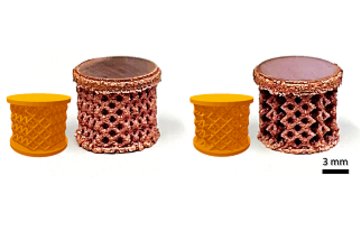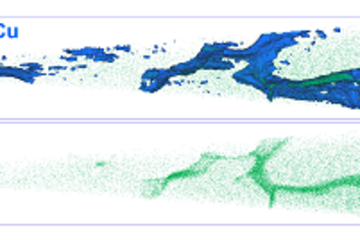All genres
1.
Journal Article
A Python Library for Pre- and Post-Processing of DAMASK Simulations. Journal of Open Research Software 10 (105), 7164 (2025)
2.
Journal Article
Inverse design of dual-phase steel microstructures using generative machine learning model and Bayesian optimization. International Journal of Plasticity 171, 103776 (2023)
3.
Journal Article
Application of a nanoindentation-based approach for parameter identification to a crystal plasticity model for bcc metals. Materials Science and Engineering A 881, 145373 (2023)
4.
Journal Article
Modeling Bainite Dual-Phase Steels: A High-Resolution Crystal Plasticity Simulation Study. Crystals 13 (4), 673 (2023)
5.
Journal Article
A machine learning model to predict yield surfaces from crystal plasticity simulations. International Journal of Plasticity 161, 103507 (2023)
6.
Journal Article
Crystal plasticity simulation of in-grain microstructural evolution during large deformation of IF-steel. Acta Materialia 237, 118167 (2022)
7.
Journal Article
Coupling crystal plasticity and cellular automaton models to study meta- dynamic recrystallization during hot rolling at high strain rates. Materials Science and Engineering A: Structural Materials Properties Microstructure and Processing 849, 143471 (2022)
8.
Journal Article
Modeling and simulation of microstructure in metallic systems based on multi-physics approaches. npj Computational Materials 8, 93 (2022)
9.
Journal Article
Predicting grain boundary damage by machine learning. International Journal of Plasticity 150, 103186 (2022)
10.
Journal Article
Characterizing Localized Microstructural Deformation of Multiphase Steel by Crystal Plasticity Simulation with Multi-Constitutive Law. Journal of the Japan Society for Technology of Plasticity 63 (732), pp. 1 - 8 (2022)
11.
Journal Article
A single-domain spectral solver for spatially nonsmooth differential equations of quasistatic solid mechanics in polar coordinates. Acta Mechanica 234, pp. 599 - 647 (2022)
12.
Journal Article
Determination and analysis of the constitutive parameters of temperature-dependent dislocation-density-based crystal plasticity models. Mechanics of Materials 164, 104117 (2022)
13.
Journal Article
Large-deformation crystal plasticity simulation of microstructure and microtexture evolution through adaptive remeshing. International Journal of Plasticity 146, 103078 (2021)
14.
Journal Article
Lath Martensite Microstructure Modeling: A High-Resolution Crystal Plasticity Simulation Study. Materials, Special Issue "Micromechanics: Experiment, Modeling and Theory" 14 (3), pp. 691 - 709 (2021)
15.
Journal Article
An efficient and robust approach to determine material parameters of crystal plasticity constitutive laws from macro-scale stress-strain curves. International Journal of Plasticity 134, 102779 (2020)
16.
Journal Article
Current Challenges and Opportunities in Microstructure-Related Properties of Advanced High-Strength Steels. Metallurgical and Materials Transactions A 51, pp. 5517 - 5586 (2020)
17.
Journal Article
Solving Material Mechanics and Multiphysics Problems of Metals with Complex Microstructures Using DAMASK-The Düsseldorf Advanced Material Simulation Kit. Advanced Engineering Materials 22 (3), 1901044 (2020)
18.
Journal Article
Using spectral-based representative volume element crystal plasticity simulations to predict yield surface evolution during large scale forming simulations. Journal of Materials Processing Technology 277, 116449 (2020)
19.
Journal Article
Quantifying the Contribution of Crystallographic Texture and Grain Morphology on the Elastic and Plastic Anisotropy of bcc Steel. Metals 9 (12), 1252 (2019)
20.
Journal Article
Coupled experimental-computational analysis of primary static recrystallization in low carbon steel. Modelling and Simulation in Materials Science and Engineering 28 (1), 014001 (2019)











